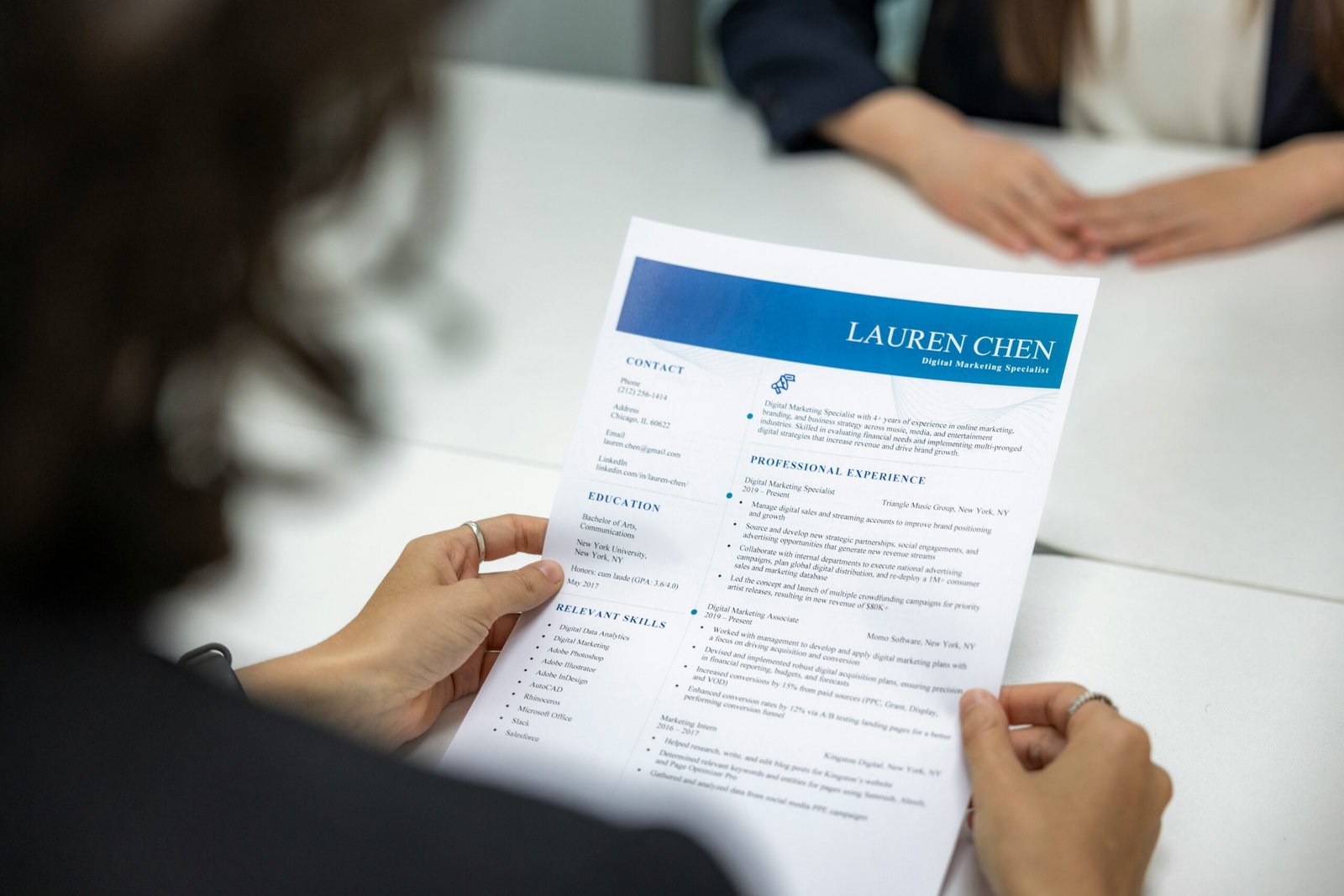Introduction to Interview Preparation
In the highly competitive job market of today, proper interview preparation is not just advisable; it is essential. With numerous qualified candidates vying for the same positions, thorough preparation can significantly enhance your chances of success. Interview preparation goes beyond merely dressing appropriately and showing up on time; it involves understanding the company, the role, and aligning your skills and experiences with the job requirements.
Preparation allows candidates to present themselves as competent and confident, demonstrating a genuine interest in the position. It showcases an individual’s commitment to the potential employer, reflecting a proactive approach that is highly valued in professional settings. Moreover, well-prepared candidates are better equipped to handle unexpected questions and scenarios that may arise during the interview.
In essence, preparation is a multifaceted process that includes researching the company culture and history, understanding the job description, and anticipating potential questions. The ability to articulate your thoughts clearly and coherently during the interview is often indicative of the level of preparation undertaken. This preparation not only boosts self-confidence but also enables candidates to leave a lasting impression, distinguishing themselves from other applicants.
Effective interview preparation can transform a daunting process into a manageable one, providing a structured approach to tackling interviews. By investing the time and effort into preparing, candidates can navigate the interview landscape with ease, showcasing their true potential and securing the job they desire.
Researching the Company
Researching the company you are interviewing with is a critical step in your preparation process. Being well-informed not only demonstrates your genuine interest in the organization but also equips you with the necessary knowledge to tailor your responses and questions effectively. Here are key aspects to focus on during your research:
Company History: Understanding the company’s background provides context for its current operations and future directions. Look into its founding year, major milestones, and significant achievements. This information helps you appreciate the company’s journey and evolution, giving you a solid foundation for your interview discussions.
Mission and Values: Familiarize yourself with the company’s mission statement and core values. These elements reflect what the organization stands for and strives to achieve. Aligning your personal values and professional goals with those of the company can make you a more attractive candidate. During the interview, you can highlight how your principles resonate with the company’s ethos.
Corporate Culture: Gaining insight into the company’s culture is essential for understanding what it might be like to work there. Look for information on the work environment, employee testimonials, and any events or initiatives that the company promotes. This knowledge helps you assess whether the company’s culture aligns with your preferences and working style.
Recent News and Developments: Stay updated on the company’s latest news and significant developments. This can include product launches, mergers, acquisitions, or any notable shifts in strategy. Mentioning recent news during your interview shows that you are proactive and engaged with current events, setting you apart from other candidates.
The Job Role: Thoroughly review the job description to understand the responsibilities, required qualifications, and key skills. Researching the department or team you’ll be working with can also provide valuable insights. Tailor your responses to showcase how your experience and skills make you the ideal fit for the role.
Do: Be well-prepared with detailed knowledge about the company. This demonstrates your commitment and enthusiasm, making a positive impression on the interviewer.
Don’t: Appear clueless or uninformed about the company. This can be a red flag, indicating a lack of interest or effort in the preparation process, which may negatively impact your chances of success.
Understanding the Job Description
One of the fundamental steps in interview preparation is thoroughly understanding the job description. This document is more than just a list of duties; it is a blueprint of the employer’s expectations and the qualifications they seek in an ideal candidate. Therefore, it is crucial to dissect the job description meticulously.
Begin by identifying the key responsibilities and required skills listed in the job description. Pay close attention to specific terms and competencies that are emphasized. These are likely the critical components the employer will focus on during the interview. Once you have a clear understanding of these elements, align your skills and experiences accordingly. Reflect on your past roles and accomplishments, ensuring they match the job requirements. This alignment not only demonstrates your suitability for the position but also showcases your attention to detail and commitment to meeting the employer’s needs.
One essential ‘do’ in this process is tailoring your resume and cover letter to the job. Customize these documents to highlight the experiences and skills that directly relate to the job description. Use the same terminology and phrases found in the job posting to create a direct connection between your qualifications and the employer’s needs. This approach can significantly enhance your chances of standing out in a competitive applicant pool.
Conversely, a critical ‘don’t’ is using a generic application. A one-size-fits-all resume and cover letter are easily identifiable and convey a lack of effort and genuine interest in the position. Such applications often fail to capture the nuances of what the employer is seeking and can be quickly dismissed in favor of those that are more specifically tailored. Personalizing your application not only underscores your enthusiasm for the role but also reflects your understanding of the job description and your proactive approach to meeting its requirements.
By thoroughly understanding the job description and tailoring your application materials, you can effectively position yourself as a strong candidate who is well-prepared and aligned with the employer’s expectations.
Preparing Your Answers
When preparing for an interview, one of the most crucial steps is to strategize your responses to common questions that you may encounter. This preparation not only boosts your confidence but also ensures that you can articulate your experiences and skills effectively. One highly recommended technique for structuring your answers, especially for behavioral questions, is the STAR method. STAR stands for Situation, Task, Action, and Result. This method provides a clear framework to discuss your past experiences in a structured and compelling manner.
Begin by describing the Situation you were in, providing enough context to make your story understandable. Next, explain the Task you needed to accomplish. Follow this by detailing the specific Actions you took to address the task. Conclude with the Result of your actions, highlighting positive outcomes and what you learned from the experience. Using the STAR method not only helps in organizing your thoughts but also demonstrates your problem-solving skills and ability to achieve results.
It’s essential to practice your answers to ensure they are clear and concise. However, avoid the pitfall of memorizing your responses word-for-word. Doing so can make you sound robotic and inauthentic, which can be a major turn-off for interviewers. Instead, focus on the key points you want to convey and practice delivering them in a natural and conversational manner. This approach allows you to adapt your responses to the flow of the conversation while still hitting all the crucial elements of your story.
Additionally, practicing with a friend or in front of a mirror can help you gain confidence in your delivery. It enables you to receive feedback and make necessary adjustments. This practice ensures that you come across as genuine and engaging during the actual interview.
Planning Your Questions
One of the most significant aspects of interview preparation often overlooked is planning your questions for the interviewer. This step is crucial as it demonstrates your genuine interest in the role and the company. Thoughtful questions can differentiate you from other candidates by showcasing your curiosity and commitment to understanding the company’s culture, values, and expectations.
To start, consider asking questions about the company’s future and strategic direction. For example, you might ask, “Can you tell me more about the company’s long-term goals and how this role contributes to achieving them?” Such a question indicates that you are thinking beyond the immediate responsibilities and are interested in how you can be a part of the company’s growth.
Another insightful question could be, “How do you measure success in this position?” This question not only highlights your focus on performance but also provides you with valuable information on what is expected from you if you are hired. It helps you understand the key performance indicators and the metrics that matter most to the company.
It is also beneficial to inquire about the team dynamics and company culture. Asking, “Can you describe the team I would be working with?” or “What are the company’s core values and how do they influence the day-to-day working environment?” shows that you are keen on fitting in and contributing positively to the team and overall company ethos.
On the other hand, one of the biggest mistakes you can make during an interview is stating that you have no questions. This can be perceived as a lack of interest or enthusiasm for the position. Always come prepared with a list of questions, even if some of them get answered during the course of the interview. This shows that you have done your homework and are seriously considering how you can contribute to the company.
In summary, planning your questions is a vital part of interview preparation. Thoughtful, well-researched questions can leave a lasting impression on the interviewer and set you apart as a candidate who is genuinely interested in the role and the company.
Dressing for Success
When preparing for a job interview, one of the most crucial aspects to consider is your attire. Dressing appropriately is not just about looking good; it’s about showing respect for the company’s culture and making a positive first impression. The way you dress can communicate a lot about your professionalism, attention to detail, and understanding of the workplace environment.
First and foremost, it’s essential to research the company’s dress code before the interview. For corporations with a formal dress code, a suit and tie for men and a tailored dress or pantsuit for women are appropriate choices. These outfits convey professionalism and an understanding of the formal business environment. On the other hand, if the company adheres to a business casual dress code, men might opt for a dress shirt with slacks, while women could consider a blouse paired with a skirt or trousers. Ensuring that your attire is clean, well-fitted, and free of distractions is key in either scenario.
The ‘do’ of dressing for an interview is to always err on the side of professionalism. Even in more casual workplaces, it’s better to be slightly overdressed than too casual. This demonstrates that you take the opportunity seriously and have put thought into your appearance. Neutral colors like black, navy, and gray are safe choices that exude professionalism. Accessories should be kept minimal to avoid drawing attention away from your qualifications.
A significant ‘don’t’ is dressing too casually or inappropriately. Avoid wearing jeans, sneakers, or overly trendy outfits unless you are certain the company’s culture supports such attire. Inappropriate clothing choices can give the impression that you are not taking the interview seriously or that you lack an understanding of professional standards. Additionally, steer clear of overly bright colors or busy patterns that may be distracting.
In summary, dressing for success in an interview is about aligning your attire with the company’s culture while maintaining a professional and polished appearance. By doing so, you can make a strong first impression and demonstrate your suitability for the role.
Practicing Interview Etiquette
Practicing proper interview etiquette is a critical component of a successful job interview. One of the foremost aspects is punctuality. Arriving on time demonstrates respect for the interviewer’s schedule and showcases your commitment and reliability. Aim to arrive at least 10-15 minutes early to allow for any unforeseen delays and to gather your thoughts before the interview begins. Conversely, being late can create a negative first impression, signaling a lack of preparation or disrespect for the interviewer’s time.
Upon meeting the interviewer, the initial greeting sets the tone for the interaction. A firm handshake accompanied by a warm, genuine smile and direct eye contact conveys confidence and professionalism. These non-verbal cues help establish a positive rapport and demonstrate your interpersonal skills. Throughout the interview, maintaining good body language is essential. Sit up straight, avoid crossing your arms, and lean slightly forward to show engagement and interest. Nodding occasionally can also indicate active listening and understanding.
Another critical aspect of interview etiquette is the follow-up. Sending a thank-you note within 24 hours of the interview is not only courteous but also provides an opportunity to reiterate your interest in the position. A well-crafted thank-you note should express gratitude for the opportunity, highlight key points discussed during the interview, and reinforce why you are an ideal fit for the role. This small gesture can leave a lasting impression and set you apart from other candidates.
By adhering to these guidelines, you can ensure that your interview etiquette reflects your professionalism and enhances your candidacy. Punctuality, a firm handshake, consistent eye contact, positive body language, and a timely follow-up are all integral components of successful interview preparation.
Handling Interview Stress
Interview stress is a common experience for many job seekers, but it can be managed effectively with the right techniques. One of the key strategies for handling interview stress is practicing relaxation methods. Deep breathing exercises, for instance, can significantly reduce anxiety by promoting a sense of calm. Before heading into the interview, take a few moments to focus on your breath, inhaling deeply through your nose and exhaling slowly through your mouth.
Visualization is another powerful tool for managing stress. By mentally rehearsing the interview, you can build confidence and reduce nervousness. Picture yourself answering questions with poise and clarity, visualizing a successful outcome. This mental preparation can help you feel more in control and less anxious when the actual interview takes place.
It’s important to maintain a positive mindset throughout the interview process. Remind yourself of your skills and qualifications, and focus on the strengths you bring to the table. Positive self-talk can be a valuable ally, helping to boost your confidence and keep negative thoughts at bay. Instead of dwelling on potential pitfalls, concentrate on the opportunities for growth and success that the interview represents.
Furthermore, staying calm during the interview is crucial. Simple techniques, such as taking a moment to collect your thoughts before answering a question, can make a significant difference. If you feel overwhelmed, it’s perfectly acceptable to pause briefly, take a sip of water, and then proceed with your response. This not only gives you a chance to compose yourself but also demonstrates to the interviewer that you can handle pressure with grace.
On the flip side, it’s essential not to let nerves get the best of you. Avoid self-sabotage by steering clear of negative thought patterns and focusing on the present moment. Remember that it is entirely normal to feel a bit anxious, but with preparation and the right mindset, you can turn that nervous energy into a positive force that propels you forward.





